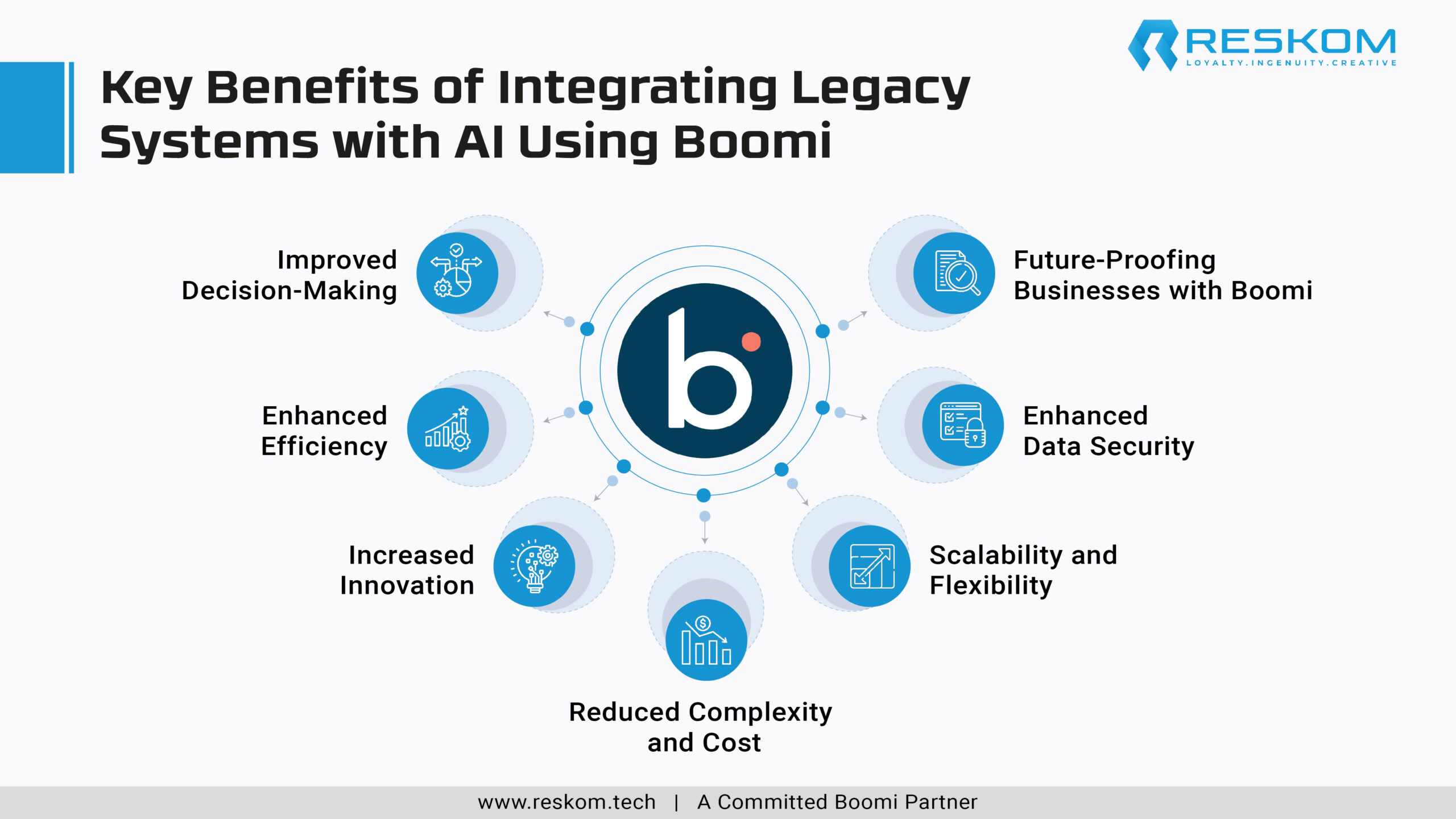Digital transformation is reshaping various industries, from healthcare to finance. According to the latest IDC Spending Guide, worldwide spending on digital transformation is expected to reach about $4 trillion by 2027. This shift is driven by the need for businesses to stay competitive, enhance efficiency, and meet customer demands. For many companies, especially those with existing legacy systems, integrating AI (Artificial Intelligence) can be challenging.
However, Boomi, a cloud-based integration platform, offers a seamless way to bridge the gap between old and new technologies. This blog will delve into how Boomi can facilitate this transformation for businesses, particularly focusing on integrating legacy systems with AI.

The Challenge of Legacy Systems
Legacy systems are older software or hardware still in use, despite the availability of newer technologies. These systems often form the backbone of many businesses, holding critical data and supporting essential operations. However, they can be outdated, inflexible, and difficult to integrate with modern applications, especially AI. This integration is crucial for businesses that want to harness the power of AI to improve decision-making, automate processes, and gain insights from data.
Breaking Down Data Silos: How Boomi Integrates Legacy Systems with AI
Imagine a manufacturing company that uses a legacy system to track production data. This data could be incredibly valuable for an AI application designed to predict equipment failures and optimize production schedules. However, without a way to connect the two systems, the AI application remains blind to this crucial information.
Boomi acts as a bridge, seamlessly connecting your legacy systems with AI applications. It translates data between different formats, ensuring smooth communication. This allows AI to access the data it needs to function effectively, unlocking a treasure trove of insights that can transform your business.
Simplifying Data Integration
One of the primary steps in integrating AI with legacy systems is ensuring that data flows smoothly between systems. Boomi excels in data integration, allowing businesses to connect disparate systems and consolidate data in real-time. By using Boomi, companies can extract data from legacy systems, transform it, and load it into AI models or data warehouses. This seamless data integration is crucial for training AI algorithms and making informed decisions based on accurate data.
Enabling Real-Time Data Processing
AI applications often require real-time data to function effectively. Boomi supports real-time data processing, ensuring that AI systems receive up-to-date information. This capability is particularly beneficial for industries like finance, where timely data is essential for tasks such as fraud detection and risk management. By integrating legacy systems with AI through Boomi, businesses can maintain a continuous flow of real-time data, enhancing the performance of their AI applications.
Streamlining API Management
APIs (Application Programming Interfaces) play a vital role in connecting legacy systems with AI. Boomi offers robust API management features that enable businesses to create, publish, and manage APIs with ease. These APIs act as bridges, allowing AI applications to communicate with legacy systems without the need for extensive reconfiguration. With Boomi’s API management, companies can securely expose legacy data to AI models, facilitating a smooth integration process.
Case Studies: Real-World Applications of Boomi in Digital Transformation
Boomi drives digital transformation by enabling rapid and scalable integration across complex IT environments. Utilizing the Boomi AtomSphere Platform, Pentair achieved seamless integration of multiple systems, enhancing customer experiences and operational efficiency. With Boomi and Cognizant’s joint efforts, Pentair standardized data integration, reduced costs, and increased agility in adapting to changing business needs. The platform’s prebuilt connectors and hybrid IT model support streamlined communication between cloud-based and on-premise systems. Ultimately, Boomi’s robust integration capabilities have positioned it as a crucial catalyst for digital transformation.
The Benefits of Using Boomi for Integration
Here are some specific benefits of integrating legacy systems with AI using Boomi:
1Improved Decision-Making: With access to real-time data from all your systems, AI can provide you with more accurate and insightful recommendations. This can lead to better decision-making across your organization.
Enhanced Efficiency: AI can automate repetitive tasks and processes, freeing up your employees to focus on more strategic work. This can significantly improve the efficiency of your operations.
Increased Innovation: AI can help you identify new opportunities and develop innovative products and services.
Reduced Complexity and Cost: Boomi’s low-code platform simplifies AI integration with legacy systems, reducing coding needs, cutting costs, and enabling faster digital transformation.
Scalability and Flexibility: Boomi’s cloud-based architecture offers scalable flexibility, enabling businesses to adapt, grow, and innovate by accommodating evolving data integration needs and new technologies.
Enhanced Data Security: Boomi ensures data security during AI integration with legacy systems through robust encryption, access controls, and compliance with industry standards, safeguarding sensitive information.
Future-Proofing Businesses with Boomi: Boomi provides a future-proof solution enabling businesses to integrate new technologies like AI, ensuring they stay competitive and agile amid rapid technological changes.
Beyond Integration: How AI Can Further Enhance Your Business
Integration is just the first step. Once you have connected your legacy systems with AI, you can begin to explore a wide range of possibilities. Here are a few examples:
- Predictive Maintenance: AI can analyze sensor data from your equipment to predict failures before they occur. This can help you avoid costly downtime and maintain operational efficiency.
- Improved Customer Service: AI can analyze customer interactions and identify trends. This information can be used to personalize customer service experiences and improve satisfaction.
- Fraud Detection: AI can analyze financial transactions to detect fraudulent activity in real-time. This can help you protect your business from financial losses.
These are just a few examples of how AI can be used to transform your business. With Boomi by your side, you can break down data silos and unlock the full potential of AI.
Summary: The Path Forward with Boomi and AI
Integrating legacy systems with AI is a crucial step for businesses looking to embrace digital transformation. Boomi provides a powerful platform that simplifies this integration, allowing companies to harness the benefits of AI without abandoning their existing systems. From improving data integration and real-time processing to streamlining API management, Boomi offers a comprehensive solution that supports businesses in their digital transformation journey.
For businesses seeking to enhance efficiency, improve decision-making, and stay competitive, integrating AI with legacy systems through Boomi is a strategic move. By leveraging Boomi’s capabilities, companies can ensure a smooth transition into the digital age, unlocking new opportunities for innovation and growth.
Ready to Take the Next Step?
Contact RESKOM now to learn more about how Boomi can help you integrate your legacy systems with AI and accelerate your digital transformation journey. Together, we can help you harness the power of data to achieve your business goals.


